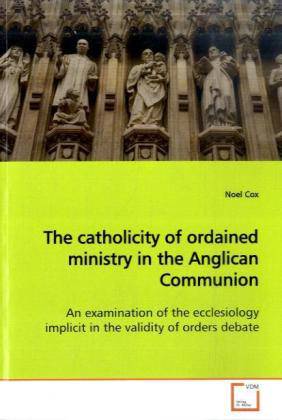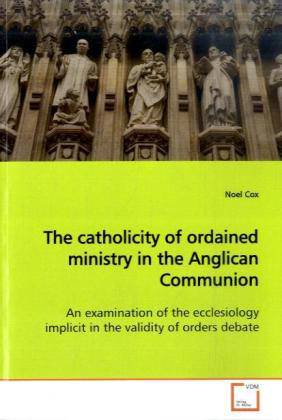
- Afhalen na 1 uur in een winkel met voorraad
- Gratis thuislevering in België vanaf € 30
- Ruim aanbod met 7 miljoen producten
- Afhalen na 1 uur in een winkel met voorraad
- Gratis thuislevering in België vanaf € 30
- Ruim aanbod met 7 miljoen producten
Zoeken
The catholicity of ordained ministry in the Anglican Communion
An examination of the ecclesiology implicit in the validity of orders debate
Noel Cox
Paperback | Engels
€ 67,45
+ 134 punten
Omschrijving
This book explores one aspect of the ongoing
validity of orders debate within the Anglican
Communion. While exploring the nature of Holy
Orders, it asks why the Communion or elements
within the Communion continues to regard the
recognition of its Holy Orders by other Churches,
and especially by the Roman Catholic Church, as
important. The understanding of ordination and the
nature of Holy Orders differed somewhat between the
Anglican Communion and the other major historical
sections of the universal church especially the
Roman Catholic Church and the Orthodox Churches
despite a degree of continuity and consistency. It
may even have differed within the Communion. But the
question of the external recognition of this
validity and the definition of validity in this
context turned upon the emphasis one placed upon
the importance of the Communion s claim to
catholicity, as part of the One Holy Catholic and
Apostolic Church . The continued emphasis upon the
universality of Holy Orders is the case study
through which the wider catholicity of the Anglican
Communion is explored.
validity of orders debate within the Anglican
Communion. While exploring the nature of Holy
Orders, it asks why the Communion or elements
within the Communion continues to regard the
recognition of its Holy Orders by other Churches,
and especially by the Roman Catholic Church, as
important. The understanding of ordination and the
nature of Holy Orders differed somewhat between the
Anglican Communion and the other major historical
sections of the universal church especially the
Roman Catholic Church and the Orthodox Churches
despite a degree of continuity and consistency. It
may even have differed within the Communion. But the
question of the external recognition of this
validity and the definition of validity in this
context turned upon the emphasis one placed upon
the importance of the Communion s claim to
catholicity, as part of the One Holy Catholic and
Apostolic Church . The continued emphasis upon the
universality of Holy Orders is the case study
through which the wider catholicity of the Anglican
Communion is explored.
Specificaties
Betrokkenen
- Auteur(s):
- Uitgeverij:
Inhoud
- Aantal bladzijden:
- 168
- Taal:
- Engels
Eigenschappen
- Productcode (EAN):
- 9783639120363
- Uitvoering:
- Paperback
- Gewicht:
- 238 g

Alleen bij Standaard Boekhandel
+ 134 punten op je klantenkaart van Standaard Boekhandel
Beoordelingen
We publiceren alleen reviews die voldoen aan de voorwaarden voor reviews. Bekijk onze voorwaarden voor reviews.







